Introduction to Domestic Turtles
Before we delve into their dietary requirements, let’s get acquainted with our domestic turtle friends:
Variety of Species:
There are over 300 species of turtles, each with unique characteristics and dietary preferences. From the tiny and terrestrial box turtle to the large and aquatic red-eared slider, domestic turtles come in various shapes, sizes, and habitat preferences.
Cold-Blooded Reptiles:
Turtles are cold-blooded, relying on external sources (like sunlight) to regulate their body temperature. This characteristic influences not only their behavior but also their metabolic rate and dietary needs.
Aquatic and Terrestrial:
Some turtles spend most of their lives in water, while others prefer land. Understanding whether your turtle is primarily aquatic or terrestrial is crucial for providing appropriate care, including diet and habitat setup.
Omnivorous Appetites
Most domestic turtles are omnivores, meaning they consume both plant-based and animal-based foods. Here’s what their diet should include:
Plant-Based Foods
Leafy Greens: Offer a variety of leafy greens such as lettuce, spinach, kale, and collard greens. These provide essential vitamins and minerals necessary for overall health and well-being. Dark, leafy greens are particularly rich in vitamin A, which is crucial for maintaining healthy eyesight and skin.
Vegetables: Carrots, green beans, bell peppers, and tomatoes are excellent choices to incorporate into your turtle’s diet. These vegetables offer a mix of nutrients, including vitamins C and K, as well as fiber, which aids in digestion.
High-Calcium Fruits: Figs, strawberries, dates, raspberries, and apricots can be part of their diet. However, fruits should make up only 10-20% of their overall food intake. While fruits offer natural sugars and additional vitamins, they should be fed in moderation to prevent obesity and imbalances in their diet.
Animal-Based Foods
Proteins: Turtles enjoy protein-rich foods to support muscle growth and repair. Insects such as worms, crickets, and mealworms are excellent sources of protein and are readily accepted by most turtles. Additionally, commercial pellets designed specifically for aquatic turtles provide a convenient and balanced source of protein.
Cooked Chicken or Beef: Offer small portions of cooked chicken or beef occasionally as a treat. These meats should be lean and free from seasoning or additives that may be harmful to turtles.
Processed Pet Foods: Drained sardines, trout chow, and other high-quality turtle pellets can be included in their diet to provide additional protein and essential nutrients. However, it’s essential to choose high-quality commercial foods specifically formulated for turtles to ensure they meet their dietary needs.
Additional Considerations
Calcium: Calcium is essential for maintaining strong bones and a healthy shell. Dusting their food with calcium powder or providing calcium supplements ensures they receive an adequate amount of this vital nutrient.
Variety: Rotate their diet to ensure a wide range of nutrients and prevent boredom. Offering a variety of foods also helps mimic their natural feeding behavior and ensures they receive all the essential nutrients they need for optimal health.
Freshwater: Always provide clean, chlorine-free water for drinking and swimming. Turtles need access to freshwater for hydration and to maintain proper bodily functions. Ensure their water is changed regularly to prevent the buildup of bacteria and other contaminants.
Age-Specific Needs
Young Turtles (7-10 years): These growing turtles require more animal-based foods for proper development. Their diet should consist of a higher proportion of protein-rich foods to support rapid growth and development during this critical stage.
Adult Turtles: As turtles mature, their dietary needs may change. While they still require a mix of plant-based and animal-based foods, adult turtles may benefit from a diet with a higher proportion of plant matter. Monitoring their weight and adjusting their diet accordingly ensures they maintain a healthy body condition throughout their life.
Avoid These Foods
Processed Human Foods: Avoid feeding turtles processed snacks, sugary items, and salty foods. These foods offer little to no nutritional value and can lead to obesity, digestive issues, and other health problems in turtles.
High-Fat Foods: Limit fatty treats like cheese and fatty meats, as these can contribute to obesity and other health issues in turtles. Instead, focus on providing lean protein sources and nutrient-rich foods to support their overall health and well-being.
Toxic Plants: Be cautious about plants toxic to turtles, such as rhubarb and avocado. These plants contain substances that can be harmful or even fatal to turtles if ingested. Always research and ensure any plants or foods offered to turtles are safe for consumption.
Feeding Frequency
Young Turtles: Feed them daily to support their rapid growth and development. Young turtles have high energy requirements and need frequent meals to fuel their growth.
Adult Turtles: Feed adult turtles every 2-3 days to maintain their health and prevent overfeeding. Monitoring their weight and adjusting their feeding schedule as needed helps prevent obesity and other health issues associated with overfeeding.
Conclusion
Understanding the dietary needs of domestic turtles is essential for providing them with a balanced and nutritious diet that supports their overall health and well-being. By offering a mix of plant-based and animal-based foods, ensuring they receive adequate calcium and other essential nutrients, and monitoring their feeding frequency and portion sizes, turtle owners can help ensure their pets lead long, healthy, and fulfilling lives. Additionally, avoiding harmful foods and providing a clean, safe environment further enhances the quality of life for domestic turtles. With proper care and attention to their dietary needs, domestic turtles can thrive and bring joy to their owners for years to come.
Related Topics:























